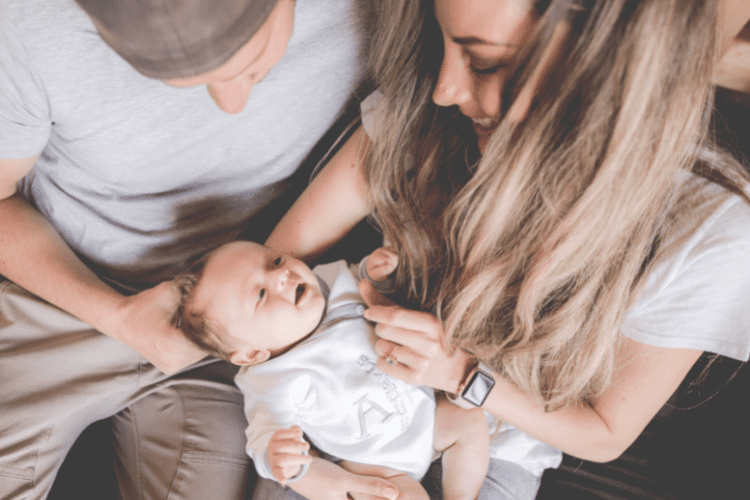Congratulations on welcoming a new baby into your world! You must be excited, exhausted and maybe a little overwhelmed, especially if your newborn will not sleep. I am here to support you and discuss how to help your newborn in the sleep department, providing ideas to help improve sleep during this fourth trimester.
First, we will discuss what period classifies a baby as being in the newborn stage. The period from when your baby is born until the 2-month mark is considered a newborn. In this guide to Newborn Won’t Sleep ideas, I will focus on the first two months of life, what we can expect in the sleep department, and ideas to help the baby who has difficulty sleeping.
Sleep Requirements
A newborn baby requires 15-20 hours of sleep in 24 hours. This would split between daytime and nighttime sleep. We often see 6-8 hours of sleep during the day and 8-9 hours at night.
Regarding naps, we usually see multiple naps a day; due to wake windows being short in the newborn stage. Naps are frequent throughout the day and total anywhere from 6-8 naps per day.
The length of nap your baby will take can vary greatly, lasting 30-60 minutes, upwards of 1-2 hours.
Importance Of Feeds
Babies primary goal is achieving and exceeding their birth weight in those first few weeks of life. This means your baby will be eating a lot during the first 2-4 weeks. We are looking at providing 8-12 feeds in 24 hours. Ideally, the bulk of the feeds will be during the day; to help achieve one longer stretch of sleep at night.
This would correlate to feeding your baby roughly every 2-3 hours during the day. A baby can not sleep well or long if they are hungry. The key to sleep success is a happy baby who has been fed and has a full belly.
If you find your baby struggling to sleep more than 30-60 minutes, ask yourself if your baby is receiving enough milk when they are feeding.
Newborns can easily fall asleep while receiving their feeds. When they are dozing at the breast or the bottle, they may not intake enough calories to be full enough for a long nap. The baby can start to feed, doze off and essentially only take in a snack feed (smaller quantity feed). A baby may fall asleep for their nap but wake up shortly after due to still being hungry.
The best way to focus on proper daily caloric intake is to make sure we are offering full feeds. This may take some encouragement and effort on your end. Keeping your baby awake during the day when while offering milk is the best way to ensure they are getting what they need. Expert tip, for babies with Jaundice, it can be even harder to keep awake.
If your baby starts dozing during the feed after only 10 minutes, you can first take one layer of clothing off your little one, which may wake them enough for them to continue with their feed.
If the baby starts to doze off again, call out their name, tickle their toes, and wake them as much as possible. If the baby begins dozing while feeding, you can do a diaper change mid-feed, doing so often helps the baby wake up enough to finish off that feed.
When it comes to the middle of the night feeds, it is a lot harder to keep babies fully awake, it is best to let them feed to the best of their ability, change their diaper mid-feed and allow them to finish it off. If your newborn falls asleep at the end of this feed, do not worry about waking them up. Place them back down in their sleep space.
Wake Windows
Often parents are missing the subtle cues of knowing when the ideal time to offer sleep for their baby. We usually place a baby down well beyond a time frame they can tolerate being awake. Causing a baby to become overtired, which makes the process of falling asleep and staying asleep more difficult.
If your baby is struggling with falling asleep, they seem to be fighting sleep, or it seems impossible to rest their bodies, they may have hit an overtired state.
The ideal wake windows for a newborn baby are shorter than what most parents expect. A newborn, especially in the first two weeks of life is usually only able to tolerate enough time to take in a feed. This may look like a feed, diaper change, and back down for a nap. Often this can occur as a 30-40 minute period of time your baby can stay awake before they developmentally need to sleep.
As the time moves forward your baby will become more aware and alert, wake windows will naturally start to extend. Your baby may now require a 35-45 minute wake window before they need a nap.
Every few weeks in the newborn stage you should see slight variations in wake windows starting to extend. If the baby is constantly overtired, it is possible they are awake too long before you provide the opportunity for them to sleep.
Sleep Cues
As mentioned, we can easily miss the very subtle sleep cues a newborn has. To support your baby in the sleep department, knowing and recognizing these cues can be the second level of successful sleep during this stage.
Level 1 – Getting Sleepy: Prep Baby For Sleep
- Glossy Eyes
- Pink/Red Eyebrows
- Avoided Eye Contact
- Starring Off or Zoning Out
These are some signs to indicate your baby is starting to feel sleepy, it is best to prepare your baby for a nap at this stage. You will have the most success putting your newborn down as soon as you start to see these sleep signs.
If your 2-4 week old is awake for 30-40 minutes and starts showing these signs, it indicates your baby can only tolerate being awake for 30-40 minutes before needing sleep. Which is developmentally normal and appropriate.
Level 2 – Now Tired: Get Baby Down For Sleep
- Fussiness
- Big Yawns
- Jerky Arm Movements
- Rubbing/Pulling Ears or Face
Your baby has entered a tired state and is ready to be put down for a nap (or have you help them fall asleep). As soon as you see these signs it is a great indication you missed the subtle level 1 sleep cues, it’s okay!
This is when I encourage my clients to stop what they are doing and focus on getting their baby down for sleep vs. having the baby hit level 3 of fatigue. The longer your baby is awake during this stage, the harder it can be to get them to fall asleep and for them to take a solid nap.
Level 3 – Overtired: Do What You Can For Baby To Fall Asleep
- Rigid Body
- Upset/Crying/Hysterical
- Difficulty Calming Down
- Arching Back/Arching Away
Placing babies down to fall asleep on their own is next to impossible when they are in an overtired state. It is best to decrease stimulation, shut off screens and lights, hold the baby and rock them to sleep or provide skin to help co-regulate their body.
Do what you need to support your baby in falling asleep. When a baby falls asleep from being overtired, it is common for them to wake up anywhere from 15-30 minutes into their nap or night sleep and become upset, it is always best to help put your newborn back to sleep for them to receive a proper period of rest.
Optimal Sleep Environment
Sound: When a baby enters our world from being in the womb it can be a shock to their system. Your baby is used to being in a never-ending state of sound in utero. Your baby heard the sound of mom’s heartbeat, blood rushing, belly gurgling, and all the sounds of the outside world.
If your baby struggles to sleep during the night, even though they seem to sleep relatively well during the day, it might be due to the fact you have tv or music on during naps, you may be talking on the phone or to your partner. At night the environment your baby is sleeping in (if silent) can feel very unfamiliar to your baby.
If you do attempt naps or night sleep in an environment without background noise it may cause difficulty for your baby to fall asleep or stay asleep. This is why I always recommend and encourage my clients to use white noise.
White noise can mimic the sounds of the womb more than other background noise, it provides reassurance, and familiarity and can help your baby sleep more soundly and connect sleep cycles.
When playing white noise you can test the decibel level it produces. Anything under 50 decibels is usually not loud enough to effectively help ease your baby, the AAP recommends white noise at 50 decibels. I have always kept mine between 50-60 decibels and found it very helpful in the sleep department.
Optimal Temperature: Newborns have a harder time regulating temperature and it is up to us to make sure we do not overdress them. If your baby is too warm or too cold it can pose difficulties for them to sleep well.
We ideally want the room they are sleeping in to be 20-22.2 degrees, this is the best temperature for sleep conditions.
If you feel your baby falls asleep well in your arms but wakes up as soon as you place them down, this may be due to the shift in temperature change. Your newborn is cozy in your arms and against your chest but when we place them into their sleep space the baby mattress is not as warm or comforting.
Expert Tip, place a warm blanket or heating pad on their mattress to help warm up the space slightly, always removing the heating pad or blanket BEFORE you place the baby down. This will help avoid such a drastic temperature shift when the baby is out of your arms and into their own sleep space.
Having your baby in a sleeper and swaddle is usually best to keep them at a proper temperature. The swaddle can help with their Moro Reflex. All newborns experience the Moro (Startle) Reflex, some babies just seem more bothered by these reflexes than others.
If you place your baby down for sleep and their arms and legs are moving in all sorts of directions, this can wake them up, disrupting the process of sleep. This is when a swaddle can come in handy.
Not every baby likes having both arms swaddled down by their sides. Often I find most babies like to have one arm out that they can access or they enjoy sleeping with both arms up. Testing out different swaddles can be the best way to figure out which swaddle your baby enjoys.
Comfort Smells: As mentioned before, the outside world is an unfamiliar place to your newborn. They want to feel safe and secure. The more the sleep environment smells familiar the better it can aid in your infant’s sleeping.
Take off the cot/bassinet/crib sheet and wrap it around you and the baby, you can do this during feeds or a contact nap. Put the sheet back on their mattress, baby may settle when you place them down knowing they have the comforting smell of dad or mom.
Short Naps
If you finally get the baby to fall asleep but you find they wake up shortly after, this likely does not mean your baby is ready to start a whole new wake window. Your baby likely is having a hard time connecting sleep cycles either due to being overtired or simply because a newborn baby can find it difficult to connect sleep cycles.
Instead of throwing in the towel after a 15-30 minute nap, this is when your support can go a long way in preserving daytime sleep. The better your baby sleeps during the day, hitting the 6-8 hours of daytime sleep, the better they will sleep at night.
You can pick up the baby and let them fall back asleep in your arms, if you transfer the baby back to their sleep space without them being in a deep enough state of sleep, you risk them waking up quickly again.
The other option is practicing what I like to call Sleep Shaping. This is the process of being hands-on, supportive, and guiding your baby to sleep while they are in their own sleep space. The more a baby falls asleep in their own cot/crib/bassinet the higher likelihood they will have longer naps.
If your baby recently had a feed and only napped for a short period, try guiding your baby back to sleep. This may take 10-20 minutes but it’s well worth the effort to honor the sleep your newborn needs.
Sleep Shaping strategies do work, if you want to watch a video on the process, here is a link where I show clients one of many methods that can work: https://www.instagram.com/reel/CRSSJZsDtOe/?igshid=YmMyMTA2M2Y=
FAQs – Ideas To Help Newborn Sleep
Question: Why Doesn’t my Newborn Sleep at Night?
Answer: Your newborn may be oversleeping during the day. Newborn babies do require a lot of sleep in 24 hours, 15-20 hours of total sleep on average. if your baby is napping amazing during the day, constantly hitting 2-3 hours of stretches of sleep when the sun is up, they may be hitting too much of their sleep needs during the day, resulting in longer periods of being awake at night.
You want to have a balance of proper daytime and nighttime sleep. First focus on capping your baby’s nap at the 2-hour mark, this will help keep daytime feeds on schedule. If your baby is not eating enough during the day, they will wake more often at night to feed. Aim for 7-10 feeds from the first-morning feed to the last feed before they go to bed.
Question: How to Soothe a Baby who Won’t Sleep?
Answer: Newborns can easily become over-stimulated which makes the process of falling asleep difficult. Infants can also become tired easily due to their low tolerability of being able to stay awake. If your baby is struggling to fall asleep or stay asleep, focus on optimizing their sleep space.
Meaning shutting off all screens, including your cell phone, turning off music and external sounds, and providing a calm environment with white noise playing in the background.
White noise mimics the sounds of the womb and this can calm a baby down and aid in the sleep department. Providing skin-to-skin in a dimmed nursery can also help soothe a baby who is struggling to sleep. Doing this can help ease your baby in the process of falling asleep.
Question: Why Will my Newborn Only sleep in My Arms?
Answer: Newborns have a Moro (Startle) Reflex, when we place them down to sleep they have involuntary movements of their body which can cause them to wake up or disrupt their state of sleep. When they are snug in our arms they feel secure and comfortable and the tightness can help with their reflex.
Newborns are used to being in the womb for usually 9 months, they are in a tight space. Mimicking this tight feeling with a swaddle or when age-appropriate a transitional suit can help your baby get used to sleeping outside of your arms.
Final Thoughts
Newborn sleep can feel like a never-ending battle, with the proper knowledge of sleep cues, age-appropriate wake windows, optimizing their sleep environment, and proving full and consistent daytime feeds, these strategies can make a world of difference.
Consistency in these strategies is what will pay off in the sleep department.
Do not worry about naps occurring on the go, whether in the vehicle or the stroller, babies can sleep well with motion as this is another familiar piece of life inside the womb.
If you are aiming for 1-2 naps a day within their sleep space you are still allowing the opportunity for your baby to recognize this area as being a comfortable place to sleep. Each nap in their own sleep space, even the short naps count as a win!
Read also:
3 Month Old Sleep Schedule Ideas
4 Month Old Sleep Schedule Ideas
10 Month Old Sleep Schedule Ideas
Kayla is a mama of two littles, each born during the Covid-19 pandemic. Prior to becoming a mom, she worked as a Registered Nurse for 12 years. Now as a Certified Pediatric Sleep Consultant, she owns and runs Serenity Sleep Consulting full time.
After having her first baby, sleep deprivation hit hard. She was desperate for rest and knew she needed to focus on establishing a healthy sleep foundation. Kayla researched infant sleep and started to focus on what she likes to call Sleep Shaping. Her son went from waking every hour to sleeping 4-5 hour stretch, followed by 6-8 hours, and eventually 12 hours at 3 months of age. This method has turned into her signature service, it allows her to provide education and tools to help families with newborns. She also works with those who have babies 4 months upwards of 4-5 years.
We all function at our optimal level with a full night’s rest and Kayla loves to support parents in this journey!





